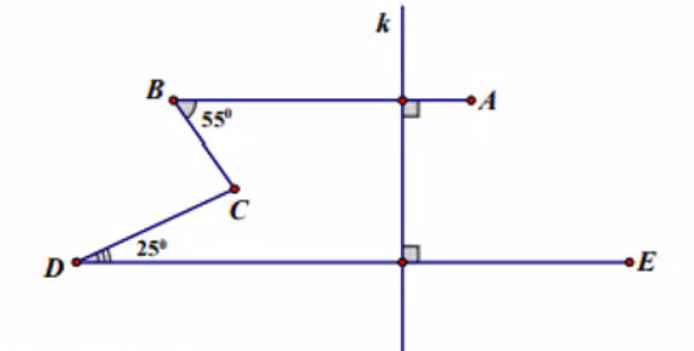Bài 1

Bài 2 Cho Hình vẽ sau: 

Hãy nhập câu hỏi của bạn vào đây, nếu là tài khoản VIP, bạn sẽ được ưu tiên trả lời.


2.
a.
\(x^2+3x=k^2\)
\(\Leftrightarrow4x^2+12x=4k^2\)
\(\Leftrightarrow4x^2+12x+9=4k^2+9\)
\(\Leftrightarrow\left(2x+3\right)^2=\left(2k\right)^2+9\)
\(\Leftrightarrow\left(2x+3\right)^2-\left(2k\right)^2=9\)
\(\Leftrightarrow\left(2x+3-2k\right)\left(2x+3+2k\right)=9\)
| 2x+3-2k | -9 | -3 | -1 | 1 | 3 | 9 |
| 2x+3+2k | -1 | -3 | -9 | 9 | 3 | 1 |
| x | -4 | -3 | -4 | 1 | 0 | 1 |
| nhận | nhận | nhận | nhận | nhận | nhận |
Vậy \(x=\left\{-4;-3;0;1\right\}\)
b. Tương tự
\(x^2+x+6=k^2\)
\(\Leftrightarrow4x^2+4x+24=4k^2\)
\(\Leftrightarrow\left(2k\right)^2-\left(2x+1\right)^2=23\)
\(\Leftrightarrow\left(2k-2x-1\right)\left(2k+2x+1\right)=23\)
Em tự lập bảng tương tự câu trên
1.
\(\Leftrightarrow x^2-2xy+y^2=-4y^2+y+1\)
\(\Leftrightarrow-4y^2+y+1=\left(x-y\right)^2\ge0\)
\(\Leftrightarrow-64y^2+16y+16\ge0\)
\(\Leftrightarrow\left(8y-1\right)^2\le17\)
\(\Rightarrow\left(8y-1\right)^2\le16\)
\(\Rightarrow-4\le8y-1\le4\)
\(\Rightarrow-\dfrac{3}{8}\le y\le\dfrac{5}{8}\)
\(\Rightarrow y=0\)
Thế vào pt ban đầu:
\(\Rightarrow x^2=1\Rightarrow x=\pm1\)
Vậy \(\left(x;y\right)=\left(-1;0\right);\left(1;0\right)\)

Đề 1:
Bài 2:
a: Xét ΔAHB vuông tại H và ΔAHC vuông tại H có
AB=AC
AH chung
Do đó: ΔAHB=ΔAHC
b: BC=12cm nên BH=6cm
=>AH=8cm
c: Xét ΔBAH có BD là phân giác
nên BH/HD=BA/AD
mà BH<BA
nên HD<DA

Bài 1:
Ta có: \(5x^3-3x^2+2x+a⋮x+1\)
\(\Leftrightarrow5x^3+5x^2-8x^2-8x+10x+10+a-10⋮x+1\)
\(\Leftrightarrow a-10=0\)
hay a=10

Bài 1:
a: \(8x^3-2x=2x\left(4x^2-1\right)=2x\left(2x-1\right)\left(2x+1\right)\)
c: \(-5m^3\left(m+1\right)+m+1=\left(m+1\right)\left(-5m^3+1\right)\)

Bài 1:
a) ĐKXĐ: \(x\notin\left\{0;-1\right\}\)
b) Ta có: \(A=\dfrac{5x+5}{2x^2+2x}\)
\(=\dfrac{5\left(x+1\right)}{2x\left(x+1\right)}\)
\(=\dfrac{5}{2x}\)
c) Để A=1 thì \(\dfrac{5}{2x}=1\)
\(\Leftrightarrow2x=5\)
hay \(x=\dfrac{5}{2}\)(thỏa ĐK)
Vậy: Để A=1 thì \(x=\dfrac{5}{2}\)